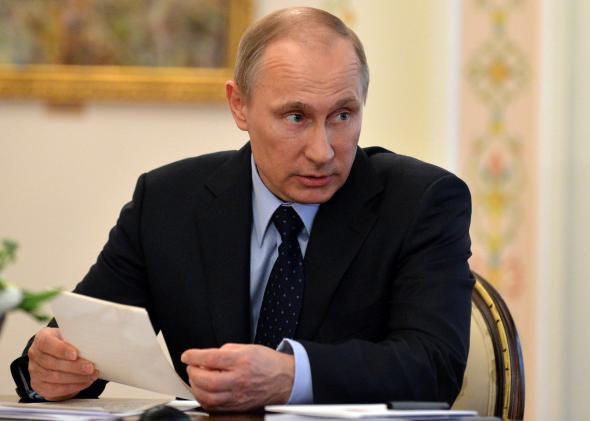The Ukraine crisis has left the United States and its Western allies feeling a bit impotent in the face of Vladimir Putin’s geopolitical he-man act. One of the key reasons why options have been so limited is that western Europe is critically dependent on Russia—and pipelines that go through Ukraine—for its oil and natural gas. Nobody really wants to start a conflagration with the country that keeps the heat on.
So a cry has gone up from Washington: To counter the Kremlin’s hydro-carbon might, the U.S. needs to start exporting some of our own super-abundant natural gas. American energy companies have been asking for that right for years, and the Department of Energy has already approved a handful of terminals that will let them ship liquefied natural gas overseas. According to Bloomberg, Republicans such as House Speaker John Boehner would like to see the process move even faster.
“One immediate step the president can and should take is to dramatically expedite the approval of U.S. exports of natural gas,” Boehner said in a March 4 statement. “We should not force our allies to remain dependent on Putin for their energy needs.”
On a gut level, the idea has a sort of neo-Cold War appeal. Russia had nukes. We had nukes. Today, they export natural gas. Why shouldn’t we do it, too? In 2012, Russia provided about 34 percent of the European Union’s natural gas imports, second only to Norway, according to the Congressional Research Service. That’s an enormous amount of economic leverage, and during the mid- and late 2000s, Russia showed a willingness to use it when it cut off supplies to some of its smaller neighbors, including Ukraine. It would be nice if the U.S., with our sea of fracked natural gas, could act as a counterweight.
Unfortunately, energy economics don’t work out quite that simply. To get a little perspective on this issue, I called up Michael Levi, director of the Program on Energy Security and Climate Change at the Council on Foreign Relations. The problem, as he explained it to me, is that tankers full of gas aren’t like missiles that can be deployed at Washington’s behest to aid our allies in Europe.
“You hear these calls for us to ship gas to Europe,” he said. “We do not ship gas to anyone. Private companies ship gas. And Europe doesn’t buy gas. Private companies in Europe buy gas. The reality is that North American natural gas is not going to be attractively priced for most European companies. You can approve all the terminals you want. You still aren’t going to get any American companies to lose money pursuing geopolitical objectives.”
Of the more than 20 applications companies have submitted to export natural gas, the Department of Energy has approved six. And, as the Wall Street Journal notes, “most if not all of that gas is going to Asia,” where prices are especially high. It will also be a while before any gas tankers start setting sail. According to the New York Times, “the first export terminal, in Sabine Pass, La., is tentatively scheduled to open in late 2015,” and “most others will not start operating until 2017 or later.”
So natural gas exports aren’t going to help us out of this particular skirmish with Russia, and they probably won’t help with the next one, either. That said, there are reasons to think that—over time and indirectly—shipping American gas overseas could begin to erode a bit of Moscow’s power.
Even before the Ukraine crisis escalated, much of Europe was already looking at ways to diversify its gas supplies beyond Russia. That process could accelerate if Putin did decide to turn off the gas spigot as an act of political retribution—which, by the way, could have severe repercussions for his country’s own economy, given its reliance on profits from fossil fuels. In that scenario, some European companies may be moved to invest in expensive infrastructure as a safety precaution. By providing its own exports, meanwhile, the U.S. could help build up a whole global market for gas—one in which countries would be a bit less reliant on any one supplier, such as Russia.
The question is whether or not building that market would pass the cost-vs.-benefits test. While energy executives are quick to deny it, the mainstream view is that exporting natural gas will lead to at least somewhat higher prices for Americans: higher heating bills, higher electric bills, and perhaps less cheap feed stock for factories that rely on natural gas for production. On the flip side, exporting could also be good for our economic growth, feeding our GDP. It’s worthwhile to keep those plusses and minuses in mind, rather than letting our frustration with a certain ex-KGB agent cloud our judgment.
